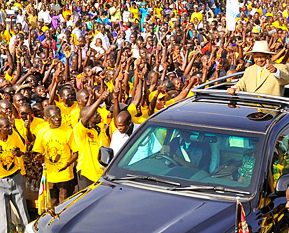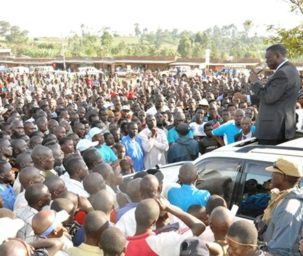|
Uganda Politics | Human rights Uganda President's campaign "still soft-handed"
Foreign election observers may hold the Ugandan President back from the typical intimidation during elections, many Ugandans hold. The European Union (EU) is among those having an observer mission in the country.
Mr Kaihura mulls over crowd control measures, should civil disturbance occur. He has mapped out "centres of gravity" - including greater Kampala - and reportedly works with Major General Aronda Nyakairima, Chief of Uganda's Defence Forces, to deploy some 3,000 special forces in Kampala. President Museveni, whose popularity has been declining, alludes victory on a wider margin. The President's ruling National Resistance Movement has fielded 405 MP candidates and 112 district heads, in contrast with FDC opposition fielding of 135 MP candidates and 52 district heads. The opposition Uganda Peoples Congress has fielded 140 MP candidates. Meanwhile, the opposition's main candidates are trying to boost public attention by portraying themselves as victims of government intimidation and election fraud attempts. The defiance by both Kizza Besigye and Olara Otunnu - the main presidential candidates - not to go to police when summoned was a neatly packaged rebellion, designed to unmask the fear the electorate has for President Museveni and a wake-up call for electorate's ability to cause social change if they vote. Although the 'Afrobarometer' had rated President Museveni's public support rate at 67 percent, the opposition views the survey as a reflection of fear, given that respondents thought interviewers were government agents. The opposition rates the President at 33 percent, claiming a majority of Ugandans want change. By Crespo Sebunya © afrol News - Create an e-mail alert for Uganda news - Create an e-mail alert for Politics news - Create an e-mail alert for Human rights news
On the Afrol News front page now
|
front page
| news
| countries
| archive
| currencies
| news alerts login
| about afrol News
| contact
| advertise
| español
©
afrol News.
Reproducing or buying afrol News' articles.
You can contact us at mail@afrol.com









